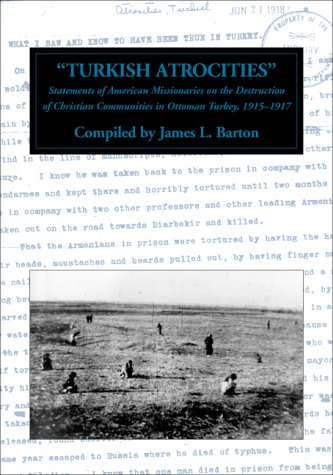Turkish Atrocities : Statements of American Missionaries on the Destruction of Christian Communities in Ottoman Turkey, 1915-1917 (Armenian Genocide Documentation Series) - Softcover

"synopsis" may belong to another edition of this title.
[Signed] James L. Barton Foreign Secretary, American Board of Commissioners for Foreign Missions.
[STATEMENT BY ALPHEUS N. ANDRUS]
Class I. Incidents to Which I Was an Eyewitness.
a. The post road from Malatia to Mosul formed one of the main avenues used by the Government in deporting the Armenians from the region between Palu on the east of Harpoot to Malatia on the west. Also parties from Erzinjan and Trebizond were brought down to Diarbekir and passed on to the plain by this road.
Mardin is at the point where this road bifurcates-one branch going south-east to Nisibin and Mosul, and the other south-west toward Ras-ul-Ain and Deir Zor. As a consequence, we, whose houses were opposite the point of bifurcation, saw a large portion of the many masses of Armenian women and children, with some sprinkling of old men, being driven, now toward Nisibin and Mosul, and now toward Ras-ul-Ain and Deir Zor, from the heights of Mardin down on to the plain where the bones of the most of them lie bleaching where they fell.
It was most harrowing to us to be implored by Protestant Armenian teachers, who spoke to us in English, to save them from their cruel fate, while we were not allowed even to go out to them to give them food and to speak comfortably unto them. There was one drove (for they were, indeed, driven like cattle) of them, quartered from morning until toward evening in the yard of neighboring monastery, to which both Moslem and Christian women of the city were permitted to take food and to converse, but it was the exception.
One old and bent-over woman fled from a company of exiled into our compound stark naked for protection, and we gathered up and took care of several of the nursing children who were left by their mothers behind the stone walls at the back of our compound; and we saw some parties from the city do the same. I visited the house of our Moslem carpenter, Sheikh Daod, and saw that he had taken in two boys and one girl from a Diarbekir deportation. A Syrian church outside the city, Mar Michael was used by the authorities as a hospital for the sick and exhausted who could not travel any farther, but the government paid no further attention to them, so they slowly died in the church. People in the lower ward were permitted to take food to them, and we sent a delegation from our compound down there and rescued one of the sick who was a teacher, hid her in our compound and nursed her to health. Of those taken down to the plain, some who were shot, stabbed, or clubbed and then thrown for dead into dry cisterns, came to consciousness, crawled up out of the cisterns and painfully dragged themselves up from the plain to our hospital, that Dr. Thom might treat their wounds. I visited them after their wounds had been bound up and Dr. Thom said that one of them reached the outside gate of the hospital and there expired.
b. After the first round up in Mardin had been made, I had occasion to go to the prison, where the men had been confined, for a financial transaction with one of them, a leading Armenian and one of the most prominent merchants of the city. He was summoned from his confinement to meet me in the ante-room of the prison. I was astonished to see how he had suffered from a bastinado, as the soles of his feet were so tender and sore that he walked with much difficulty and evidently in pain.
c. As in the journey of our exile we rode from Diarbekir to Sivas, we used each day to count the graves and unburied bodies of Armenians by the roadside. These averaged 100 per day, and then, too, we would not see them all from our wagon. When near Hekim Khan, we saw, on the right side of the road, and at a little remove from it, a large and beautiful Armenian woman laid out on her back, stark naked, white as ivory, and cold in death. Near her were three children, the youngest just about dead from hunger and exposure. There were bed-clothes for them. The youngest was lying down, and the other two sitting among the bedding. The two zaptiehs were greatly moved by the sight as well as we. The wagons were stopped and the zaptiehs went up to the group. One of the zaptiehs was so moved that he determined to rescue the two boys, and we put them in the load wagon and gave them water and a little food at first. When we reached Hekim Khan for the night, the zaptieh took them to a Moslem orphanage in the village.
"About this title" may belong to another edition of this title.
- PublisherGomidas Inst
- Publication date1998
- ISBN 10 1884630049
- ISBN 13 9781884630040
- BindingPaperback
- Edition number1
- Number of pages224
- Rating
Buy New
Learn more about this copy
Shipping:
FREE
Within U.S.A.
Top Search Results from the AbeBooks Marketplace
Turkish Atrocities : Statements of American Missionaries on the Destruction of Christian Communities
Book Description Paperback. Condition: New. Brand New!. Seller Inventory # VIB1884630049

